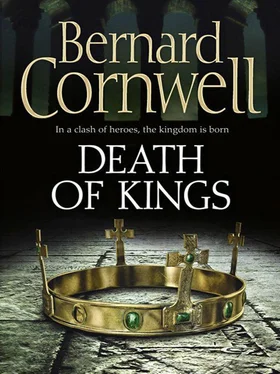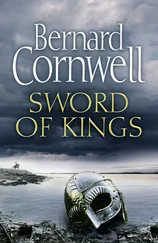Edward seemed startled to see me. ‘It’s Sigelf,’ he said, ‘he’s ignoring my messengers! You sent a man to him, didn’t you? And I’ve sent five more! Five! But they come back telling me he’s refusing to retreat! He says it’s too dark and he’s waiting for the dawn, but God knows he’s risking his men. The Danes will be awake at first light.’ He sighed. ‘I’ve just sent another man with orders that they must retreat.’ He paused, frowning. ‘I’m right, aren’t I?’ he asked me, needing reassurance.
I did not answer. I stayed silent because at last I saw what the Norns were doing. I saw the pattern in the weave of all our lives and I understood, finally, the war that passed all understanding. My face must have looked shocked because Edward was staring at me. ‘Lord King,’ I said, ‘order the army to march back across the bridge, then join Sigelf. Do you understand?’
‘You want me to…’ he began, confused.
‘The whole army!’ I shouted. ‘Every man! March them to Sigelf now!’ I shouted at him as though he were my underling and not my king, because if he disobeyed me now he would not be a king much longer. Maybe it was already too late, but there was no time to explain it to him. There was a kingdom to be saved. ‘March them now,’ I snarled at him, ‘back the way we came, back to Sigelf, and hurry!’
And I ran for my horse.
I took my twelve men. We led the horses over the bridge, then mounted and followed the road towards Huntandon. It was a black night, black and cold, rain spitting into our faces and we could not ride fast. I remember being assailed by doubt. Suppose I was wrong? If I was wrong then I was leading Edward’s army back into the battleground the Danes had chosen. I was stranding them in the river loop, perhaps with Danes on every side, but I resisted the doubt. Nothing had made sense, and now it all made sense, all except for the fires that burned far to the north. There had been one smoke plume in the afternoon, now I could see three huge blazes, betrayed by their reflected glow on the low clouds. Why would the Danes be burning halls or villages in King Eohric’s land? It was another mystery, but not one I worried about because the fires were far off, a long way beyond Huntandon.
It was an hour before a sentry challenged us. It was one of my men and he led us to where Finan had the remainder in a patch of woodland. ‘I didn’t retreat,’ Finan explained, ‘because Sigelf isn’t moving. God knows why.’
‘You remember when we were in Hrofeceastre,’ I asked him, ‘talking to Bishop Swithwulf?’
‘I remember.’
‘What were they loading onto the ships?’
There was a moment’s pause as Finan realised what I was saying. ‘Horses,’ he said quietly.
‘Horses for Frankia,’ I said, ‘and Sigelf comes to Lundene and claims he doesn’t have enough horses for his men.’
‘So now a hundred of his men are part of Lundene’s garrison,’ Finan said.
‘And ready to open the gates when the Danes arrive,’ I continued, ‘because Sigelf is sworn to Æthelwold or to Sigurd or to whoever has promised him the throne of Cent.’
‘Jesus and Joseph,’ Finan said.
‘And the Danes haven’t been indecisive,’ I said, ‘they were waiting for Sigelf to declare his loyalty. Now they have it, and the Centish bastard isn’t retreating because he expects the Danes to join him, and maybe they already have, and they think we’re going west and they’ll march fast southwards and Sigelf’s men in Lundene will open the gates and the city will fall while we’re still waiting for the earslings in Bedanford.’
‘So what do we do?’ Finan asked.
‘Stop them, of course.’
‘How?’
‘By changing sides, of course,’ I said.
How else?
Doubt weakens the will. Suppose I was wrong? Suppose Sigelf was simply a stubborn and stupid old man who really did think it was too dark to retreat? But though the doubts assailed me I kept on, leading my men east around the marshland that anchored the right of Sigelf’s line.
The wind was sharp, the night was freezing, the rain malevolent and the darkness absolute, and if it had not been for the Centish campfires we would surely have been lost. A slew of fires marked Sigelf’s position, and there were still more just to the north, which told me that at least some Danes had now crossed the river and were sheltering from the weather in the hovels around the old Roman house. Those mysterious great fires, the big glow of burning halls, also showed much farther north, and those three I could not explain.
So much, and not just those distant fires, defied understanding. Some Danes had crossed the river, but the glow of fires on the northern bank told me that most still remained in Huntandon, which was strange if they intended to move southwards. Sigelf’s men had not moved from where I had left them, which meant there was a gap between his men and the nearest Danes, and that gap was my opportunity.
I had left our horses behind, all of them tethered in woodland, and my men were on foot and carrying shields and weapons. The fires guided us, but for a long time we were so far from the nearest blaze that we could not see the ground and so we stumbled, fell, struggled, waded, and forced our way through the marsh. At least once I was up to my waist in water, the mud was clinging to my boots and the tussocks were tripping me, while startled birds screamed as they flew into the night, and that noise, I thought, must surely warn our enemies that we were on their flank, yet they seemed oblivious.
I sometimes lie awake in the long nights of old age and I think of the mad things I have done, the risks, the dice throws that challenged the gods. I remember assaulting the fort at Beamfleot, or facing Ubba, or creeping up the hill at Dunholm, yet almost none of those lunacies rivalled that cold, wet night in East Anglia. I led one hundred and thirty-four men through the winter darkness, and we were attacking between two enemy forces that together numbered at least four thousand. If we were caught, if we were challenged, if we were defeated then we would have nowhere to run and no place to hide except in our graves.
I had ordered all my Danes to be the vanguard. Men like Sihtric and Rollo, whose native tongue was Danish, men who had come to serve me after losing their lords, men who were sworn to me even though we fought against other Danes. I had seventeen such men, and to them I added my dozen Frisians. ‘When we attack,’ I had told them, ‘you shout Sigurd.’
‘Sigurd,’ one of them said.
‘Sigurd!’ I repeated. ‘Sigelf’s men must think we’re Danes.’ I gave the same instruction to my Saxons. ‘You shout Sigurd! That’s your war cry till the horn sounds. You shout and you kill, but be ready to pull back when the horn sounds.’
This was going to be a dance with death. For some reason I thought of poor Ludda, slaughtered in my service, and how he had told me that all magic is making someone think one thing while, in truth, another is happening. ‘You make them watch your right hand, lord,’ he told me once, ‘while your left is picking their purse.’
So now I would make the men of Cent believe they had been betrayed by their allies, and if the trick worked I hoped to turn them back into good men of Wessex. And if it failed then Ælfadell’s prophecy would come true and Uhtred of Bebbanburg would die in this miserable winter swamp and I would kill most of my men alongside me. And how I loved those men! On that miserable cold night as we advanced to a desperate fight they were full of enthusiasm. They trusted me as I trusted them. Together we would make reputation, we would have men in halls across Britain telling the story of our exploit. Or of our deaths. They were friends, they were oath-men, they were young, they were warriors, and with such men it might be possible to storm the gates of Asgard itself.
Читать дальше
Конец ознакомительного отрывка
Купить книгу












